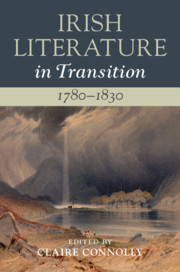Book contents
- Irish Literature in Transition, 1780–1830
- Irish Literature in Transition
- Irish Literature in Transition, 1780–1830
- Copyright page
- Contents
- Contributors
- Series Preface
- General Acknowledgements
- Acknowledgements
- Introduction
- Part I Origins
- Part II Transitions
- Part III Reputations
- Part IV Futures
- Chapter 17 ‘My country takes her place among the nations of the earth’: Ireland and the British Archipelago in the Age of the Union
- Chapter 18 Mentalities in Transition: Irish Romanticism in European Context
- Chapter 19 Ireland and Empire: Popular Fiction in the Wake of the Union
- Chapter 20 Transatlantic Influences and Futures
- Chapter 21 The Literary Legacies of Irish Romanticism
- Index
Chapter 21 - The Literary Legacies of Irish Romanticism
from Part IV - Futures
Published online by Cambridge University Press: 28 February 2020
- Irish Literature in Transition, 1780–1830
- Irish Literature in Transition
- Irish Literature in Transition, 1780–1830
- Copyright page
- Contents
- Contributors
- Series Preface
- General Acknowledgements
- Acknowledgements
- Introduction
- Part I Origins
- Part II Transitions
- Part III Reputations
- Part IV Futures
- Chapter 17 ‘My country takes her place among the nations of the earth’: Ireland and the British Archipelago in the Age of the Union
- Chapter 18 Mentalities in Transition: Irish Romanticism in European Context
- Chapter 19 Ireland and Empire: Popular Fiction in the Wake of the Union
- Chapter 20 Transatlantic Influences and Futures
- Chapter 21 The Literary Legacies of Irish Romanticism
- Index
Summary
The chapter traces the rich legacy of the romantic literature in Ireland, through consideration of the varied influences of key Irish and English writings of the later eighteenth and early nineteenth century on Irish writers of recent decades. It suggests that the reappraisal of romanticism in the 1980s and 1990s has important implications for Irish literary history, in that the plurality and inclusiveness of the ‘romantic period’ and increasing emphasis on historical contexts, locations, colonialism, and gender are especially helpful for approaching leading Irish writers of the time, such as Maria Edgeworth, Edmund Burke, Thomas Moore, Richard Brinsley Sheridan, and emerging genres such as national tales, gothic fiction, political prose, and periodical literature. Recognition of the variousness of romantic-period literature also complicates the later twentieth-century legacies, opening lines of inheritance from John Clare to Michael Longley, Maria Edgeworth to William Trevor, Raftery to Derek Mahon. The perhaps better-known engagements of Seamus Heaney with Wordsworth, Paul Muldoon with Samuel Taylor Coleridge and Robert Southey, or Ciaran Carson with John Keats are thus considered as part of the larger picture of continuing connections between the romantic period and modern Irish literature.
- Type
- Chapter
- Information
- Irish Literature in Transition, 1780–1830 , pp. 402 - 421Publisher: Cambridge University PressPrint publication year: 2020



